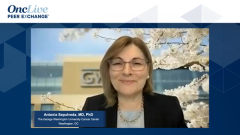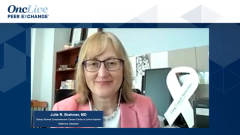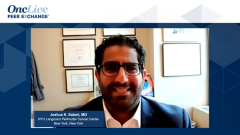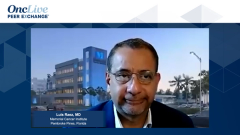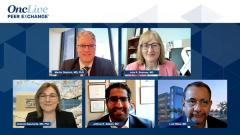
Treatment of NTRK Fusions in NSCLC
Julie R. Brahmer, MD, and Joshua K. Sabari, MD, review recent data on entrectinib and larotrectinib for the treatment of patients with NSCLC with NTRK fusions.
Episodes in this series

Transcript:
Martin Dietrich, MD, PhD: Looking at a different target, maybe a brief update on the rare but very exciting find for patients: NTRK [neurotrophic tyrosine receptor kinase] fusions. Dr Brahmer, Dr Sabari, maybe you can give us your thoughts on these first lines. Dr Brahmer, you can start us off with your thoughts on entrectinib.
Julie R. Brahmer, MD: Certainly, the NTRK fusions are very uncommon in non–small cell lung cancer, but you don’t want to miss [them] because this disease is extremely sensitive to these type of inhibitors, with the median duration of response in this setting of approximately 27 months. It’s a no-brainer; you can’t miss these patients. A good response rate both systemically of about 60% to 65%, and then a near 60% intracranial response as well. These type of drugs in the right patient are life-changing and can have a dramatic difference in these patients and give them an option for therapy that gets them down the road to certain very important events for them. While this is not curative yet, it does give them a great option to therapy.
Martin Dietrich, MD, PhD: Dr Sabari, maybe you can give us a brief update on larotrectinib and how you choose between those 2 agents.
Joshua K. Sabari, MD: Sure. To echo Dr Brahmer, these are rare as hens’ teeth, 0.25%. Dr Sepulveda mentioned earlier, if you’re not doing RNA-based assays, you may miss these. I sometimes will even reflex to a FusionSeq or a fusion assay where you have a priori pile PCR [polymerase chain reaction]-based assays to try to enrich for these fusions. I do that in patients who are negative or nondiagnostic on DNA-based assays. If you have a young patient, fit, never smoker, and you don’t identify anything by DNA, definitely look at RNA if you can. And as Dr Brahmer mentioned, these therapies are quite phenomenal. For larotrectinib, there was an update by Jessica Lin, MD, with 30 patients. Not big populations, and this is a pooled analysis of 2 trials. These are true targeted therapies. They showed us a 74% response rate with 3 complete responses. Excellent CNS [central nervous system] penetration, 67% intracranial response rate. And then I think what’s really exciting here is if you look at the duration of response, it’s 34 months. Patients are on these therapies for a long time. PFS [progression-free survival] and OS [overall survival] are hitting that 4-year mark. I think these are real wins. They’re rare, and you cannot miss these in your patients.
Martin Dietrich, MD, PhD: I think there’s going to be more hope. We’re going to be seeing, hopefully, the introduction of repotrectinib soon, maybe even a sequence. I think the NTRK dependence maintains the different sites. A lot of the resistance mutations occur on target, so hopefully even better results in the near future with sequencing strategies.
Transcript is AI-generated and edited for clarity and readability.


